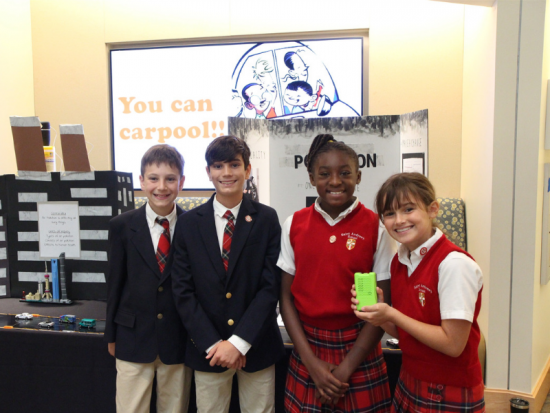The local newspaper wrote an article about the students' project using PocketLab Air.
Grade 5 students at Saint Andrew’s School caught wind of startling air pollution statistics during their studies which inspired them to take action and make a difference in their community. With a little help from Upper School Math teacher, Jim Scheidegger, as well as a Stanford professor and COO of a company in Silicon Valley, Ashley Egbert, Eli Cornell, Keely McGahee, and David Capeti went to work on a groundbreaking project that measured air quality in Boca Raton.
Jim Scheidegger helped these four Scots obtain possession of a scientific tool very few other students or adults have access to - a new handheld device that measures air quality. The device is called the PocketLab Air.
The PocketLab Air - about as big as an iPhone - stands in stark contrast to scientific grade air quality sensors used by the EPA or at a university. Those devices are much larger, cost anywhere from $20,000 to over $50,000, and are completely stationary.
In fact, Saint Andrew’s School is the first school in Florida to have such a cutting-edge piece of equipment. Using the PocketLab Air, these four students measured air quality during morning drop-off, as cars idled in lines in front of the school. Then they measured the quality of the air later in the day when the parking lot was relatively free of idling cars. “The difference in carbon dioxide levels according to the PocketLab Air devise was enormous,” said Ashley Egbert.
After hours of air quality experimentation, students determined results that all residents of South Florida would find startling.
While cars were running, the Pocket Air device measured high levels of carbon dioxide at 1,080 ppm. “After we measured the air around the cars for about 10 minutes, we decided to put the device closer to an exhaust pipe of a running car, and test the carbon dioxide levels there. The levels went up by 300 points,” said Ashley.
“Later in the day when we measured the air quality of our parking lot with no running cars, we measured the carbon dioxide level at 663 ppm, which shows just how many more toxins we are breathing in because of fossil fuel emissions,” she added.
Ashley, Eli, Keely, and David were supported in their research endeavors by a strong faculty who works in partnership and support of one another and the students. Saint Andrew’s employs two experienced co-teachers in each classroom, which was a key aspect to their success with the PocketLab Air. “I was so pleased to facilitate the use of the PocketLab Air. It gave our students such a strong sense of ownership and agency,” said Jennifer Barcella, Grade 5 Teacher.
“The Saint Andrew’s IB/PYP program provides students many opportunities to ‘take action’ and make a difference in their community,” offered Aruanda Yowell, Grade 5 Teacher, “and I am so proud to see how Ashley, Eli, Keely, and David collected and analyzed information that they knew would have an impact for residents of Boca Raton and South Florida,” she added.
The COO of PocketLab Air, Dave Bakker, was a critical partner in making this data available to grade 5 students and to the community with the help of his friend, Mr. Scheidegger. “I want to say congratulations to Saint Andrew's School,” offered Bakker. “You are the first school in Florida to be using the PocketLab Air!”
Currently, there is no other portable low-cost product like PocketLab Air on the market. Other than are a few nice inexpensive hobby systems, which have limited measurement capabilities, PocketLab Air is the only low-cost hand-held device today that measures more than one air quality indicator.
In addition to his work as COO of PocketLab, Dave Bakker is also a professor at Stanford University. The story of how PocketLab Air formed is one that champions Saint Andrew’s School staunch belief in the value of entrepreneurship.
“While working as a mentor for a graduate engineering class, one of the students had a business plan idea to make affordable, easy to use sensors for hands-on lab activities. This student was a Ph.D. student doing his dissertation on miniaturizing sensors. We both felt his sensor was an excellent idea, so when the class finished, I helped him form a company and get initial funding for the first product,” commented Bakker.
PocketLab Air was incorporated in 2014 and has been growing very fast. There are already PocketLabs in more than 60 countries worldwide with hundreds of thousands of students using them. “One of our most exciting partners is in Canada - a joint program with Tellus World of Science, King’s University, and the Alberta government. Read more about that partnership here.
PocketLab Air Partnerships continue throughout Canada, and in the states including Maryland and Kentucky. The company is also starting to work with top-notch University programs committed to climate science including Stanford, Carnegie Mellon, and Berkeley University.
“There are probably universities in Florida that would be interested in having a PocketLab Air device, but we having gotten that far yet,” offered Bakker.
Dave Bakker can count the students of Saint Andrew’s School and their trailblazing use of the PocketLab Air device to inspire others in South Florida, including local schools and universities, to follow our lead as we work to clear the air.
Click here to read more about Saint Andrew’s PocketLab Air story as covered in the Boca Tribune.

